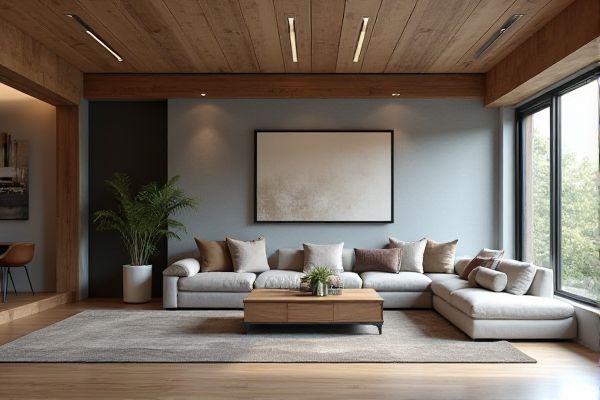
Powder-coated metal offers a durable, evenly colored finish that resists chipping and corrosion, ideal for outdoor or high-traffic applications, while brushed metal showcases a sleek, textured surface that highlights the natural grain but may be more prone to scratches. Understanding the differences in appearance, durability, and maintenance will help you make the best choice for your project--read on to explore these finishes in detail.
Table of Comparison
| Feature | Powder-Coated Metal | Brushed Metal |
|---|---|---|
| Finish | Durable, smooth, vibrant color | Matte, textured lines with a satin look |
| Durability | Highly resistant to scratches, corrosion, and weather | Resistant to minor scratches, less protective against corrosion |
| Maintenance | Easy to clean, resists staining | Requires regular cleaning to maintain appearance |
| Application | Ideal for outdoor furniture, automotive parts, appliances | Popular in interior design, appliances, electronics |
| Cost | Moderate, depends on coating thickness and complexity | Generally lower, depends on metal type and finishing process |
| Environmental Impact | Eco-friendly powder process with minimal VOC emissions | Less impactful, but involves metal polishing processes |
Introduction to Powder-Coated and Brushed Metal
Powder-coated metal features a durable, smooth finish created by applying a dry powder that is cured under heat, resulting in enhanced corrosion resistance and vibrant color options. Brushed metal, characterized by a textured, matte surface achieved through a unidirectional satin finish, offers a sleek, modern appearance with visible grain patterns. Both finishes serve distinct aesthetic and functional purposes across industries like automotive, architecture, and consumer electronics.
Material Composition and Surface Treatments
Powder-coated metal involves a dry powder made of resin and pigment particles electrically charged and sprayed onto metal, offering a durable, corrosion-resistant finish with vibrant color options. Brushed metal features a mechanical surface treatment where abrasive brushes create fine, consistent lines on metals like stainless steel or aluminum, enhancing texture and reducing the appearance of fingerprints. Understanding these differences helps you select the right finish for durability, aesthetic preference, and maintenance requirements in your metal products.
Visual Aesthetics: Color and Texture Differences
Powder-coated metal offers a smooth, uniform finish with vibrant color options that resist chipping and fading over time, providing a sleek and consistent appearance. Brushed metal features a textured surface with fine lines that enhance its natural metallic sheen, resulting in a subtle, matte look with a sophisticated tactile quality. Your choice depends on whether you prefer the bold, customizable palette and durability of powder coating or the elegant, understated texture of brushed metal.
Durability and Scratch Resistance
Powder-coated metal offers superior durability and scratch resistance due to its thick, protective polymer coating that guards against chipping, corrosion, and UV damage. Brushed metal showcases a textured finish that can mask minor scratches but is more prone to visible wear and surface blemishes over time. For environments requiring enhanced protection against abrasion and harsh conditions, powder-coated metal remains the more resilient choice.
Corrosion Protection and Environmental Factors
Powder-coated metal provides superior corrosion protection through a thick, durable polymer finish that resists moisture, chemicals, and UV damage, extending the lifespan of metal surfaces in harsh environments. Brushed metal, while aesthetically pleasing with its textured finish, lacks an additional protective layer, making it more susceptible to rust and corrosion when exposed to moisture or pollutants. Environmental factors such as humidity, saltwater exposure, and temperature fluctuations significantly influence the durability of metal surfaces, with powder coating offering enhanced resilience in these challenging conditions.
Maintenance and Cleaning Requirements
Powder-coated metal requires minimal maintenance as its durable, protective finish resists scratches, chipping, and corrosion, making cleaning simple with mild soap and water. Brushed metal, while visually appealing due to its textured surface, tends to show fingerprints, smudges, and scratches more easily, necessitating frequent wiping with a soft cloth and specialized metal cleaners to maintain its appearance. Understanding the differences in upkeep can help you choose the best material suited to your maintenance routine and aesthetic preferences.
Cost Comparison and Value
Powder-coated metal generally offers a more cost-effective solution compared to brushed metal due to lower production and maintenance expenses, making it ideal for budget-conscious projects. While brushed metal provides a premium aesthetic with greater scratch resistance, its higher material and fabrication costs can significantly impact overall expenses. Evaluating long-term durability and project requirements helps determine which metal finish delivers the best value for specific applications.
Applications in Architecture and Design
Powder-coated metal offers durable, weather-resistant finishes ideal for exterior architectural elements like facades and railings, providing vibrant color options and long-lasting protection against corrosion. Brushed metal excels in interior applications such as wall panels, fixtures, and furniture, where its textured, matte surface adds a sleek, modern aesthetic while resisting fingerprints and minor scratches. Both finishes enhance design versatility, with powder coating emphasizing durability and color customization, and brushed metal focusing on subtle elegance and tactile appeal.
Environmental Impact and Sustainability
Powder-coated metal offers a more environmentally friendly option compared to brushed metal due to its lower VOC emissions and efficient use of materials, reducing waste during production. Brushed metal often requires more intensive processing and chemical treatments, which can increase its environmental footprint. Choosing powder-coated metal for Your projects can support sustainability goals by promoting longer-lasting finishes that reduce the need for frequent replacements.
Choosing the Right Finish for Your Project
Choosing between powder-coated metal and brushed metal depends on your project's durability and aesthetic needs. Powder-coated metal offers superior resistance to corrosion, scratches, and fading, making it ideal for outdoor or high-traffic applications. Brushed metal provides a sleek, textured look with visible grain patterns, perfect for modern interiors where a stylish, matte finish is desired.
 homyna.com
homyna.com